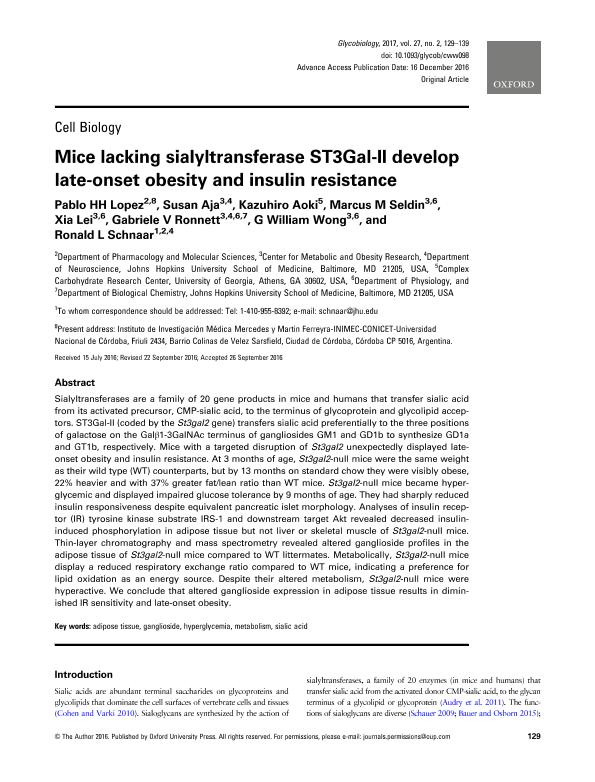Artículo
Mice lacking sialyltransferase ST3Gal-II develop late-onset obesity and insulin resistance
Lopez, Pablo ; Aja, Susan; Aoki, Kazuhiro; Seldin, Marcus M.; Lei, Xia; Ronnett, Gabriele V; Wong, G. William; Schnaar, Ronald L.
; Aja, Susan; Aoki, Kazuhiro; Seldin, Marcus M.; Lei, Xia; Ronnett, Gabriele V; Wong, G. William; Schnaar, Ronald L.
 ; Aja, Susan; Aoki, Kazuhiro; Seldin, Marcus M.; Lei, Xia; Ronnett, Gabriele V; Wong, G. William; Schnaar, Ronald L.
; Aja, Susan; Aoki, Kazuhiro; Seldin, Marcus M.; Lei, Xia; Ronnett, Gabriele V; Wong, G. William; Schnaar, Ronald L.
Fecha de publicación:
05/01/2017
Editorial:
Oxford Univ Press Inc
Revista:
Glycobiology
ISSN:
0959-6658
e-ISSN:
1460-2423
Idioma:
Inglés
Tipo de recurso:
Artículo publicado
Clasificación temática:
Resumen
Sialyltransferases are a family of 20 gene products in mice and humans that transfer sialic acid from its activated precursor, CMP-sialic acid, to the terminus of glycoprotein and glycolipid acceptors. ST3Gal-II (coded by the St3gal2 gene) transfers sialic acid preferentially to the three positions of galactose on the Galβ1-3GalNAc terminus of gangliosides GM1 and GD1b to synthesize GD1a and GT1b, respectively. Mice with a targeted disruption of St3gal2 unexpectedly displayed lateonset obesity and insulin resistance. At 3 months of age, St3gal2-null mice were the same weight as their wild type (WT) counterparts, but by 13 months on standard chow they were visibly obese, 22% heavier and with 37% greater fat/lean ratio than WT mice. St3gal2-null mice became hyperglycemic and displayed impaired glucose tolerance by 9 months of age. They had sharply reduced insulin responsiveness despite equivalent pancreatic islet morphology. Analyses of insulin receptor (IR) tyrosine kinase substrate IRS-1 and downstream target Akt revealed decreased insulininduced phosphorylation in adipose tissue but not liver or skeletal muscle of St3gal2-null mice. Thin-layer chromatography and mass spectrometry revealed altered ganglioside profiles in the adipose tissue of St3gal2-null mice compared to WT littermates. Metabolically, St3gal2-null mice display a reduced respiratory exchange ratio compared to WT mice, indicating a preference for lipid oxidation as an energy source. Despite their altered metabolism, St3gal2-null mice were hyperactive. We conclude that altered ganglioside expression in adipose tissue results in diminished IR sensitivity and late-onset obesity.
Palabras clave:
Adipose Tissue
,
Ganglioside
,
Hyperglycemia
,
Metabolism
,
Sialic Acid
Archivos asociados
Licencia
Identificadores
Colecciones
Articulos(INIMEC - CONICET)
Articulos de INSTITUTO DE INV. MEDICAS MERCEDES Y MARTIN FERREYRA
Articulos de INSTITUTO DE INV. MEDICAS MERCEDES Y MARTIN FERREYRA
Citación
Lopez, Pablo; Aja, Susan; Aoki, Kazuhiro; Seldin, Marcus M.; Lei, Xia; et al.; Mice lacking sialyltransferase ST3Gal-II develop late-onset obesity and insulin resistance; Oxford Univ Press Inc; Glycobiology; 27; 1; 5-1-2017; 129-139
Compartir
Altmétricas



